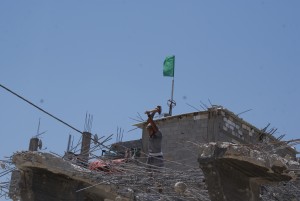Arab pride on the streets of Antwerp
An Arab community group has organised patrols on Antwerp streets to counter what it calls a “manhunt” by police of Moroccan youths. Khaled Diab reports on what has been criticised as a “private militia”.
There is new trouble in the 'hood for the Arab European League (AEL). The radical civil rights group has come under intense fire from across the political spectrum since the launch of its controversial scheme to mobilise community patrols to monitor the police on Antwerp's streets.
The group's outspoken leader, Dyab Abou Jahjah, argues the patrols are necessary to avoid a “manhunt” of Moroccan youths – blamed by the far-right for much of the city's crime – as the police embark on a major crime crackdown.
The anti-immigrant far-right Vlaams Blok, which wants the AEL banned and the Lebanese-born Abou Jahjah stripped of his Belgian nationality, have reacted with venom and have accused the AEL of employing guerrilla tactics and of setting up a “private militia”.
But even moderate voices have expressed concerns over the necessity and legality of the scheme and fear it may be little more than a publicity gimmick. Prime Minister Guy Verhofstadt said it was the government's job to monitor the police and he would not allow the creation of a de facto police “no-go zone”.
Abou Jahjah, dubbed the Arab Malcolm X, insists he has no wish to undermine the state's authority. “We don't want to substitute the state, but show it the way,” he explains in his apartment. Outside, a policeman has stood guard ever since the AEL president started receiving death threats.
He says his small organisation aims to do this by mobilising and empowering the Arab community in Belgium, and then across Europe, to campaign for their civil rights. “A weak community cannot achieve equal rights,” he points out.
He is a vocal critic of the government's integration policy, the Vlaams Blok and discrimination in employment and education. He explains that the time has come for the 300,000-strong Arab community to take its political destiny into its own hands.
His message has found some resonance among marginalised Belgian-born Moroccan youth, mainly in Antwerp. “For the young people involved with the League, it has opened up their eyes on the political level,” says Mohamed Doukkali of the School without Racism. “They used to accept their situation, now they question their position in society and their rights.”
Nevertheless, there are widespread concerns in the Arab community and mainstream society about the movement's vision and tactics.
“Dyab is right when he wants to start a movement of Arab Pride,” says Lucas Catherine, a leading Belgian intellectual and an authority on Islam. “Dyab is wrong in the way he reacts politically … His tactics are sectarian: he not only refuses to work with Belgian allies, he also refuses to cooperate with other Arab intellectuals and community leaders.”
Abou Jahjah dismisses as failures the efforts of other grassroots organisations and Arab politicians. “These people are not part of the community, they're part of the Belgian political apparatus,” he charges.
Rather than challenging right-wing stereotypes, some see in Abou Jahjah's stance a tacit acknowledgment of them. “Unfortunately, this helps reinforce the picture of Arabs as uneducated and aggressive,” a community campaigner noted.
Others worry that Abou Jahjah's rejection of immigrants who wish to integrate and the AEL's passionate Arab nationalism could drive a wedge in the community, which contains a large Berber minority, and may alienate other Muslims, such as Turks.
“Abou Jahjah doesn't recognise the diversity within immigrant communities,” points out Badra Djait, a researcher into immigrant issues at Leuven University.
Critics are concerned that Abou Jahjah is effectively trying to raise the ghetto walls by promoting the idea of segregated Arab neighbourhoods with their own schools and institutions. “A healthy society has to manage differences, not repress them,” argues Abou Jahjah.
The timing of the AEL's announcement last week that they would be fielding candidates in next year's federal elections has been greeted with scepticism. Abou Jahjah's threat to set up an Arab political party has also been widely criticised.
“Creating an Arab or Muslim party will not serve the mass of citizens of foreign origin in any way shape or form,” Jamal Zahri, a member of the Federation of Mosques recently told daily Le Soir. “On the contrary it could only exacerbate our differences and hatred between us.”
Others fear that Abou Jahjah's definition of cultural assertiveness borders on cultural chauvinism. Some have even compared some of the AEL's politics to those of the Vlaams Blok.
Abou Jahjah — whose organisation is currently petitioning to ban a film that depicts a love affair between the teenage son of Vlaams Blokkers and the daughter of conservative Muslims — rejects such parallels. He says the far right want superiority while the AEL want equality. “The Vlaams Blok say ‘our people first', we say ‘our people, too'.”
Nevertheless, there is concern that his fiery rhetoric plays into the hands of the far right in their bid to stigmatise Muslims in the public eye. “Now they have a real face in the immigrant community to demonise,” says Djait.
And, with Islamaphobia on the rise in Europe, the last thing the Arab community needs is a ‘demon' for the far-right to use to fan the flames of discrimination.
___________
This article appeared on Expatica on 28 November 2002.


